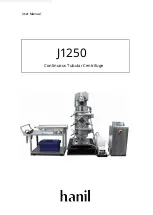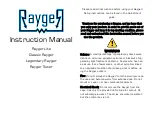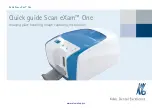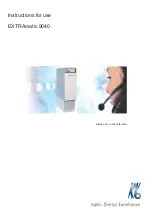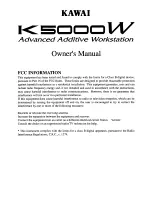
12
3M
™
Steri‑Vac
™
Sterilizer / Aerator GSX Series
– Operator’s Manual
7.4. Air Supply Specifications
DANGER: To reduce the risks associated with exposure to ethylene oxide,
ensure that the compressed air supply is clean, with a maximum allowable dirt particle size of 05 microns, and that the air supply is free of oil Ensure that the air filters on the compressed
air supply contain a water trap and are cleaned daily (if applicable) and are properly maintained
Air Supply Feature
Specification
Pressure
70 kg/cm
2
(100 psig) minimum to 105 kg/cm
2
(150 psig) maximum
Flow Rate
22 liters per second at 53 kg/cm
2
(47 standard cubic feet per minute at 75 psig) per sterilizer based on 100% duty cycle compressor
Quality
Clean air supply with a maximum allowable dirt particle size of 05 microns and free of oil
Moisture Content
Less than 10°C (50°F) dew point
8 Compliance and Reference Standards
8.1. Device Safety Compliance
Ethylene oxide (EO) sterilizers, for use in industrial applications, (ie outside a health care facility) are not regulated as medical devices by the United States FDA; therefore, they are not eligible for
510(k) review and clearance
The 3M™ Steri‑Vac™ Sterilizer/Aerator GSX Series complies with the following standards as demonstrated by the CB Scheme Certificate and test report issued by the Underwriters
Laboratories (UL):
•
IEC / EN 61010‑1 (2001) Safety requirements for electrical equipment for measurement, control, and laboratory use ‑ Part 1: General requirements
•
IEC / EN 61010‑2‑010 (2003) Safety requirements for electrical equipment for measurement, control and laboratory use ‑ Part 2‑010: Particular requirements for laboratory equipment for
the heating of materials
•
IEC / EN 61010‑2‑040 (2005) Safety requirements for electrical equipment for measurement, control, and laboratory use ‑ Part 2‑040: Particular requirements for sterilizers and
washer‑disinfectors used to treat medical devices The following clauses were not evaluated as part of the IEC 61010‑2‑040: Clause 131, 1311012, 1311014, 131102, 1311032,
1311033, 13101
The 3M™ Steri‑Vac™ Sterilizer/Aerator GSX Series is listed as Laboratory Electrical Equipment for Use in Health Care Applications (Certified for Canada) and carries the UL mark with adjacent
indicators “C” and “US” based on compliance to the standards UL 61010‑1 and CAN/CSA 222 No 61010‑1
The 3M™ Steri‑Vac™ Sterilizer/Aerator GSX Series complies with the CE mark related to the Low Voltage Directive (LVD) 2006/95/EC as confirmed in the Declaration of Conformity
The 3M™ Steri‑Vac™ Sterilizer/Aerator GSX Series complies with the RoHS Directive, Directive 2011/65/EU of the European Parliament and of the Council on the restriction of the use of certain
hazardous substances in electrical and electronic equipment
In the European Union, the 3M™ Steri‑Vac™ Sterilizer/Aerator GSX Series are certified as exempt from the scope of the ATEX Directive
8.2. Electromagnetic Compatibility (EMC) Compliance
The 3M™ Steri‑Vac™ Sterilizer/Aerator GSX Series complies with the following EMC standards as confirmed in the Certificate of Compliance generated by 3M:
IEC 61326‑1 Electrical equipment for measurement, control and laboratory use ‑ EMC requirements ‑ Part 1: General requirements
The 3M™ Steri‑Vac™ Sterilizer/Aerator GSX Series complies with the EMC requirements of the CE mark EMC Directive 2004/108/EC
The 3M™ Steri‑Vac™ Sterilizer/Aerator GSX Series complies with the Australian EMC requirements as confirmed in the Supplier’s Declaration of Conformity that is linked to the RCM Mark
Note:
This equipment has been tested and found to comply with the limits for a Class A digital device, pursuant to Part 15 of the FCC Rules These limits are designed to provide a reasonable
protection against harmful interference when the equipment is operated in a commercial environment This equipment generates and can radiate radio frequency energy; and, if not
installed and used in accordance with the instruction manual, may cause harmful interference to radio communications Operation of this equipment in a residential area is likely to cause
harmful interference in which case the user will be required to correct the interference at his/her own expense In addition, operation of this device must accept any interference received,
including interference that may cause undesired operation
This Class A digital equipment meets all requirements of the Canadian Interference‑Causing Equipment Regulations





























